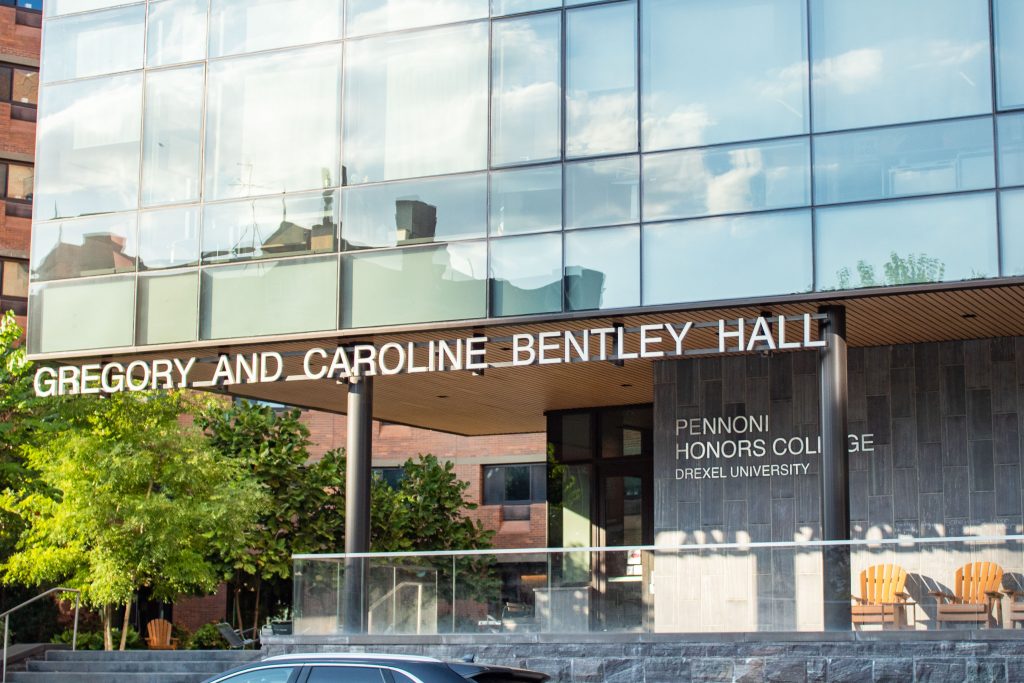
Just a month into his new role, the recently appointed Dean of Drexel’s Pennoni Honors College, Dr. Neville Vakharia, is embracing the vibrant energy that defines the school. “It’s been great. Amazing people, amazing students. I’m just having a blast,” he said.
Vakharia succeeds Dr. Paula Marantz Cohen, who stepped down after over a decade of leadership that enriched both student life and academics at Pennoni and Drexel as a whole. Though he acknowledges that he has “a lot to learn,” Vakharia is excited to build on that foundation, diving into his new responsibilities and setting the stage for the college’s future.
A “triple Dragon” with a PhD in information science, an MS in arts administration and a B.S. in materials engineering, the Dean brings a uniquely diverse background to his role. Originally trained as an engineer, he has transitioned into a career that includes nonprofit work and the arts. “I think I’ve always been sort of an interdisciplinary person,” he shared. “I was able to practice as an engineer, but I also realized that everything we study — whether it’s engineering or design or arts — teaches you a way of thinking.” This broad perspective has guided him throughout his career, allowing him to translate his skills across fields. “Interdisciplinary is a way of thinking that gets you where you want to go,” he said.
Despite leaving traditional engineering, Vakharia emphasizes how much of that training informs his current work. “Studying engineering at Drexel really taught me about problem-solving, project management, and ways to come at a problem based on evidence and fact, but also accounts for the people involved,” he explained. “As an engineer, you’re constantly thinking, ‘How can I improve something? How can I solve a problem or address a need?’ That mindset is so important to everything I do, even now.”
Vakharia’s interdisciplinary background shapes his vision to encourage Drexel students — particularly those in STEM fields — to engage more with the arts and other fields outside their majors. “We always have to look beyond the boundaries of our discipline,” he urged. “If we explore other fields and disciplines, it can help us in turn with our own.” He prompts students to take classes outside their major, engage with diverse faculty and avoid limiting themselves to one track. “Drexel is a large university with such a diverse population and courses. There’s something for everyone here,” he added.
The dean is particularly focused on raising awareness about all that the Honors College offers. “I was surprised how few people actually know the depth of what Pennoni does,” he remarked. Describing the Honors College as “the intellectual and social hub of the university,” he outlined his plans to foster “broad thinking, civil discourse, interdisciplinary innovation, and student learning.”
In the coming years, increasing engagement across the university will be a key focus. “We want to be more proactive in engaging the entire campus community in various intellectual and social endeavors,” he said. Part of this approach involves meeting with internal and external stakeholders, aligning Pennoni’s goals with Drexel’s greater needs and developing a strategic plan to drive the college forward.
For students interested in joining the Honors College or simply making the most of their Drexel experience, Vakharia encourages a mindset of curiosity and exploration. “We’re looking for students who want to get the most out of their time at Drexel, who are intellectually curious, whose interests span multiple disciplines, and who want to have fun,” he said, adding that Pennoni holds a variety of events ranging from panel discussions to activities like trivia and pumpkin carving.
Beyond social and academic engagement, the Honors College also places a strong emphasis on civic and social impact. “Social impact and civic engagement are very important pillars of Pennoni,” Vakharia explained. “All students engaged in Pennoni — whether as Honors students or through other academic programs — are getting enhanced learning in civic engagement. We even have a new Honors with Distinction program that allows students to get civically engaged, whether it’s here in West Philadelphia or in their home countries.”
Reflecting on his time as both a Drexel student and now as an administrator, Vakharia strongly believes this is a stirring moment for the university. “I’ve seen multiple decades of Drexel in my studies, and I think this is the most exciting time in the university’s history,” he said. “We’re undergoing a major academic transformation that’s going to enhance the student experience.”
His advice to current students is simple: “Look for the connections in your academic journey. Just because you study one particular field doesn’t mean that’s the only field where you can apply your skills. Rather than thinking of courses, think of skills. And you never know where life will lead you — so follow that direction and make the most of what you can.”
With his interdisciplinary approach and commitment to student success, Vakharia is well-positioned to lead the Honors College into a novel era. As he put it, “We’re open for business, and we’re here to serve you.”


